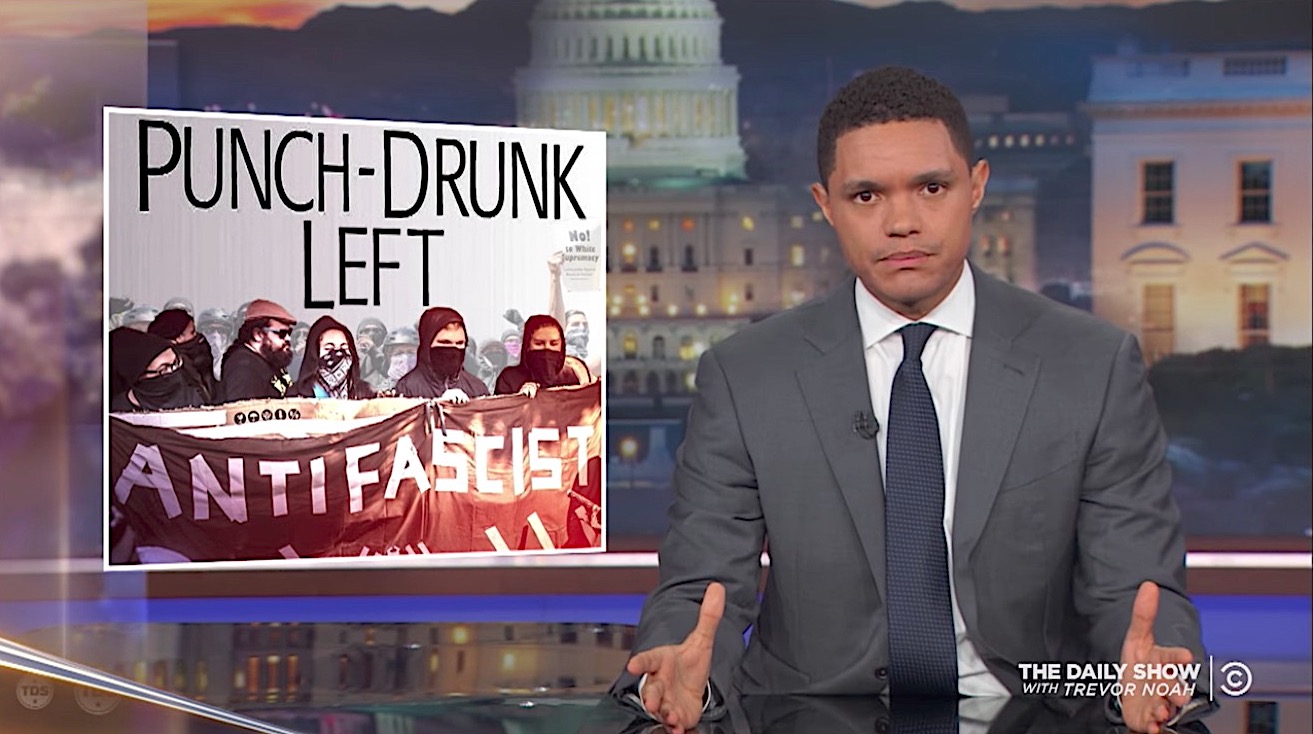Trevor Noah looks at the different flavors of 'antifa,' urges the 'vegan ISIS' wing to cut it out


A free daily email with the biggest news stories of the day – and the best features from TheWeek.com
You are now subscribed
Your newsletter sign-up was successful
On Thursday's Daily Show, Trevor Noah took a hard look at a far-left group that's getting a lot of press these days. "Anti-fascist, 'antifa' — first of all, that's a great name," he began. "It's short, it's punchy ��� excuse the pun — and most importantly, you don't need to know how to spell 'fascist.'" But the group isn't monolithic. "Because antifa has no defined leadership, there's no clear way to know what they're actually meant to do, and not do," he said. Some of them are focused on identifying neo-Nazis so they can be held accountable later, others view antifa as a form of cosplay mixed with righteous indignation about the alt-right claiming ownership of anime and obscure Japanese video games.
There's another faction that just wants to "burn it all down," and also smash Starbucks windows, Noah said, and he sadly shook his head at their professed belief that breaking stuff would convince anyone that fascism is bad. "But the part that's been causing the most headaches is the one that's hitting people in the head," he said, circling back to last weekend's violence at an otherwise peaceful anti-racism protest in Berkeley.
"You see, now here's the real problem," Noah said. "It doesn't matter what your 'noble goal' may be, it doesn't matter what you say you're fighting for. When people see that, all they think is, 'Oh s--t, it's vegan ISIS.'" When this antifa bloc thinks "you're punching Nazis, you don't realize that you're also punching your cause," he said, and if they do realize that and just want the attention, Fox News can't get enough. "Because your opponents, they'll just use every violent incident to discredit your entire movement," Noah said, "and they make it seem like, in a world where white supremacists have a friend in the White House, the real problem is you guys." Watch below. Peter Weber
The Week
Escape your echo chamber. Get the facts behind the news, plus analysis from multiple perspectives.

Sign up for The Week's Free Newsletters
From our morning news briefing to a weekly Good News Newsletter, get the best of The Week delivered directly to your inbox.
From our morning news briefing to a weekly Good News Newsletter, get the best of The Week delivered directly to your inbox.
A free daily email with the biggest news stories of the day – and the best features from TheWeek.com
Peter has worked as a news and culture writer and editor at The Week since the site's launch in 2008. He covers politics, world affairs, religion and cultural currents. His journalism career began as a copy editor at a financial newswire and has included editorial positions at The New York Times Magazine, Facts on File, and Oregon State University.
-
 How the FCC’s ‘equal time’ rule works
How the FCC’s ‘equal time’ rule worksIn the Spotlight The law is at the heart of the Colbert-CBS conflict
-
 What is the endgame in the DHS shutdown?
What is the endgame in the DHS shutdown?Today’s Big Question Democrats want to rein in ICE’s immigration crackdown
-
 ‘Poor time management isn’t just an inconvenience’
‘Poor time management isn’t just an inconvenience’Instant Opinion Opinion, comment and editorials of the day
-
 ‘One Battle After Another’ wins Critics Choice honors
‘One Battle After Another’ wins Critics Choice honorsSpeed Read Paul Thomas Anderson’s latest film, which stars Leonardo DiCaprio, won best picture at the 31st Critics Choice Awards
-
 A peek inside Europe’s luxury new sleeper bus
A peek inside Europe’s luxury new sleeper busThe Week Recommends Overnight service with stops across Switzerland and the Netherlands promises a comfortable no-fly adventure
-
 Son arrested over killing of Rob and Michele Reiner
Son arrested over killing of Rob and Michele ReinerSpeed Read Nick, the 32-year-old son of Hollywood director Rob Reiner, has been booked for the murder of his parents
-
 Rob Reiner, wife dead in ‘apparent homicide’
Rob Reiner, wife dead in ‘apparent homicide’speed read The Reiners, found in their Los Angeles home, ‘had injuries consistent with being stabbed’
-
 Hungary’s Krasznahorkai wins Nobel for literature
Hungary’s Krasznahorkai wins Nobel for literatureSpeed Read László Krasznahorkai is the author of acclaimed novels like ‘The Melancholy of Resistance’ and ‘Satantango’
-
 Primatologist Jane Goodall dies at 91
Primatologist Jane Goodall dies at 91Speed Read She rose to fame following her groundbreaking field research with chimpanzees
-
 Florida erases rainbow crosswalk at Pulse nightclub
Florida erases rainbow crosswalk at Pulse nightclubSpeed Read The colorful crosswalk was outside the former LGBTQ nightclub where 49 people were killed in a 2016 shooting
-
 Trump says Smithsonian too focused on slavery's ills
Trump says Smithsonian too focused on slavery's illsSpeed Read The president would prefer the museum to highlight 'success,' 'brightness' and 'the future'
